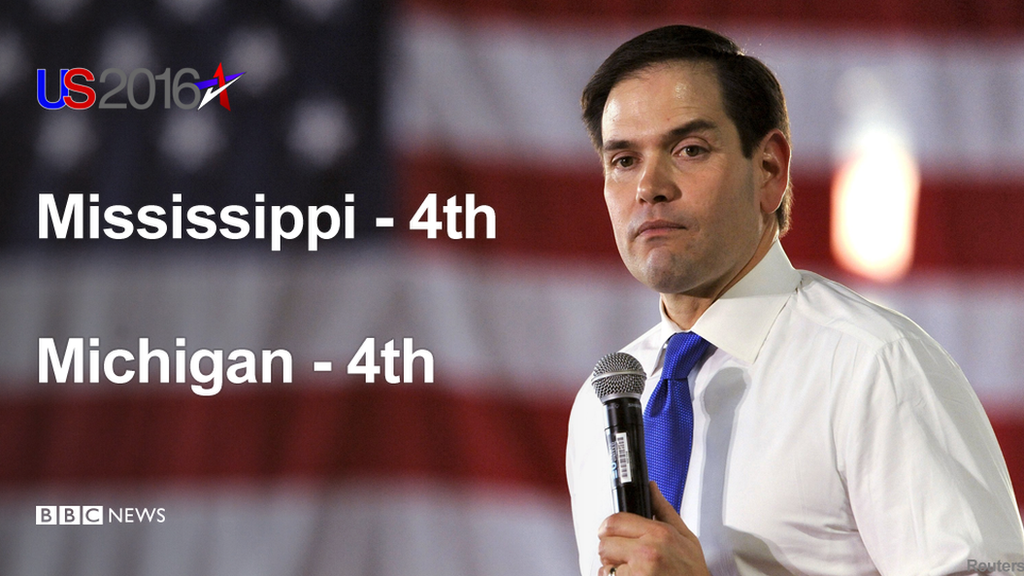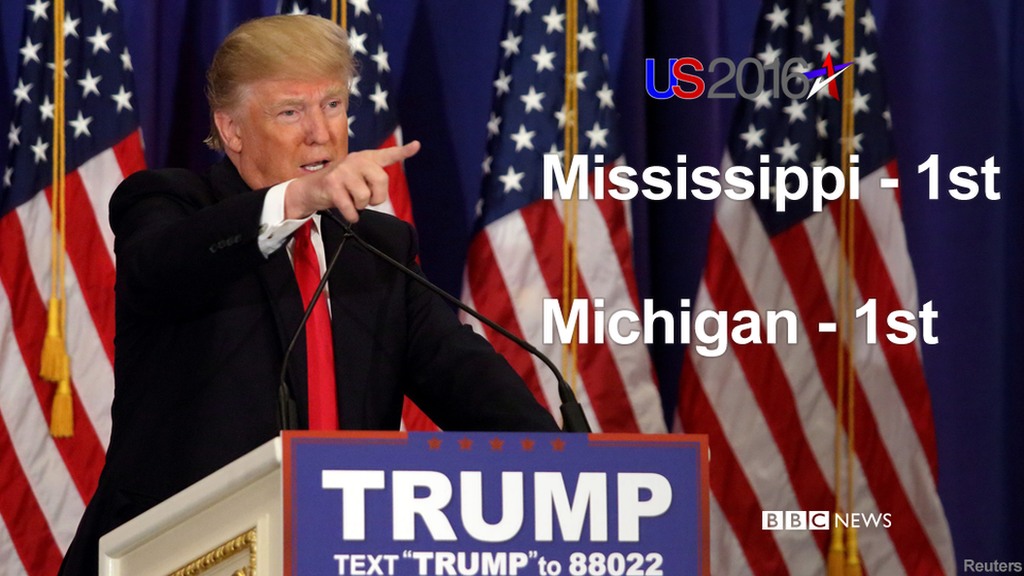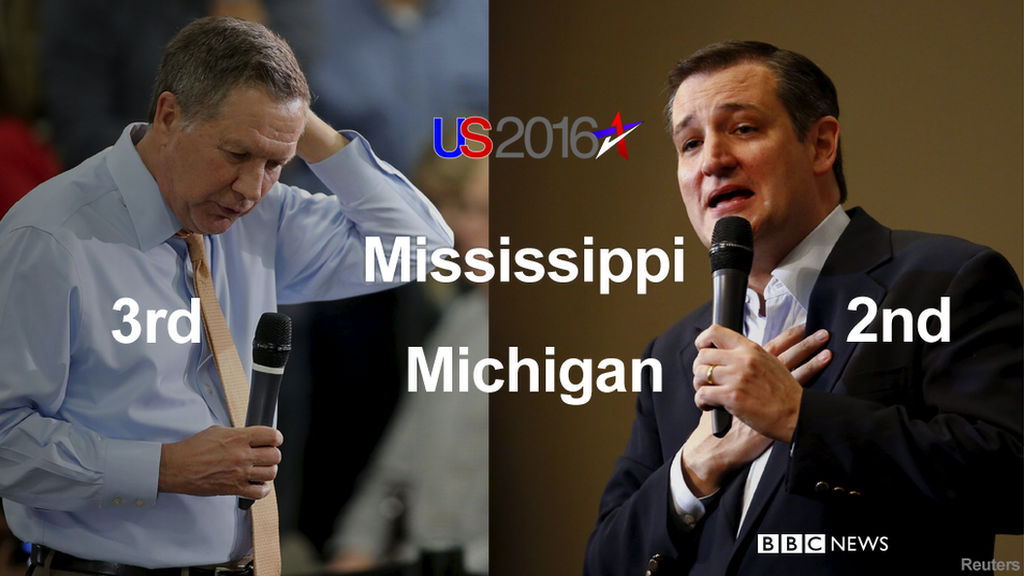US election 2016: Has Donald Trump killed off Marco Rubio?
- Published
- comments
Donald Trump won two more states on his march toward the Republican nomination - did he kill off Marco Rubio's presidential dream in the process?
Call it "lesser Tuesday" - the respite between the blockbuster Southern primaries on 1 March and the key winner-take-all votes in Ohio and Florida on 15 March.
While the voting in Mississippi, Michigan, Idaho and Hawaii doesn't have the same kind of glamour or import as the other key electoral dates in March, that doesn't mean there aren't lessons to learn from the day's results.
The Marco Rubio death watch

Fourth place stings. If Marco Rubio were an Olympian, he'd be clapping politely and picking a nice spot to watch the medal ceremony. If it were a horse race, Rubio backers would be tearing up their betting slips.
Once again the Florida senator took a drubbing across the board, with single-digit finishes in both Michigan and Mississippi netting him zero convention delegates.
He may only place a few percentage points ahead of Ben Carson in Mississippi, who dropped out of the race last week and hasn't had a political pulse in weeks. It's got so bad Donald Trump didn't even feel compelled to belittle the candidate in his victory speech.
Full results - how the states were won
In hindsight his decision to wage total war against Mr Trump, flinging mud with both fists, was a disastrous mistake. And if his attacks were supposed to be a selfless kamikaze mission against the front-runner, well, the USS Trump is still steaming ahead.
Mr Rubio now has exactly one week to pull off a minor miracle and defeat Mr Trump in his home state of Florida. A win there likely won't improve his presidential prospects, which are basically zero, but it could salvage his pride. It would also do a great service for the anti-Trump forces, who are now largely left hoping for a primary season that ends in a draw and a brokered convention.

Top Trump

Reports of Donald Trump's demise are ... well, you know the drill by now.
After taking a beating from Mr Rubio and Ted Cruz at the Republican debate last week and being denounced by 2012 Republican presidential nominee Mitt Romney on Saturday, the media were rife with reports that the front-runner's formidable armour might be cracking. He underperformed in voting on Saturday, posting losses in Kansas and Maine and only narrow wins in Kentucky and Louisiana. Perhaps the relentless attacks were finally taking a toll?
Er, no.
Mr Trump once again showed he has nationwide appeal. He dominated the vote in a Southern state not bordering Mr Cruz's Texas home, and rolled to victory in Michigan. That second win is particularly key, since the South is largely done voting but the Mid-West - with its blue-collar voters hit hard by the decline in US manufacturing - is just starting to weigh in.
Who is voting for Donald Trump?
In search of Trump's Scottish roots
Trump detractors may take some solace in the fact that both Michigan and Mississippi held primaries that were open to non-Republicans - a setup that has favoured the New Yorker in the past. Most of the remaining states only allow participation by registered Republicans.
They shouldn't get their hopes up too high, however. According to exit polls in both Michigan and Mississippi, Mr Trump performed equally well among Republicans and the unaffiliated.
Mr Trump is now in a position to deliver a mortal blow to his opponents next week and send the Republican establishment into full-on paroxysms of despair.

Cruz and Kasich survive

Going into Tuesday's voting, some thought that Mr Cruz could build on his weekend momentum and post a surprise win in Mississippi. Others speculated that Ohio Governor John Kasich could demonstrate his Mid-Western appeal and pull out a Michigan victory, as he invested considerable time and money there.
In the end Mr Trump won by comfortable margins in each state - which is hardly good news for either challenger.
Is Cruz the most radical Republican?
Mr Kasich can find a bit of a silver lining in Mr Rubio's abysmal performance, however. Without the Florida senator in the picture, he looks likely to pick up the mantle of the mainstream, moderate candidate. Of course this primary landscape is now littered with the bodies of establishment politicians, so he may not want to get too comfortable.
As for Mr Cruz, he pushed Mr Kasich for second place in Michigan, which has to be encouraging. If he's going to battle Mr Trump all the way to the Republican convention, the Texas senator will have to continue to show support outside his native South. He did beat Mr Trump in sparsely populated Idaho but the delegate prize was tiny.

Good news, bad news for Clinton

Once again Hillary Clinton posted a dominating win in a Southern state, taking Mississippi by nearly 70% and netting a lion's share of its 36 delegates.
Michigan was another story, however. Although polls showed her with a comfortable lead, Democratic voters had other ideas - and Bernie Sanders delivered a surprise defeat to the front-runner.
The good news for the former secretary of state is that big wins coupled with narrow losses will only continue her climb ahead of the Vermont senator in the all-important delegate count for the Democratic convention. Thanks to her dominating performance across the South, she's already built up a sizable lead, and Tuesday's balloting will add to it.
The most progressive president ever?
The bad news is that the South is nearly done voting, and the Michigan results could indicate that she will be in a dogfight with Mr Sanders in the Mid-West. While she still is the odds-on favourite to win the nomination, a series of narrow victories - or losses - from here on out will do little to encourage Mr Sanders to quit the race.
Instead, she seems destined to grind out a long, hard primary campaign against a stubborn opponent.

The delegate tracker - charting who's ahead in the nomination races.